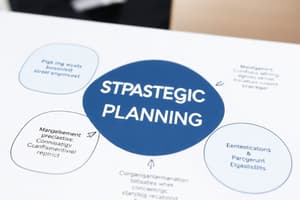Podcast
Questions and Answers
What is the primary goal of strategic planning?
What is the primary goal of strategic planning?
- To set work standards for employees.
- To develop short-term tactical goals.
- To define major goals for the future. (correct)
- To create alternatives for unexpected situations.
Which of the following is NOT a characteristic of tactical planning?
Which of the following is NOT a characteristic of tactical planning?
- It is generally short-term in nature.
- It develops methods to achieve strategic goals.
- It involves detailed planning.
- It focuses on the long term. (correct)
Which of the following planning types involves preparing for potential crises?
Which of the following planning types involves preparing for potential crises?
- Contingency planning (correct)
- Operational planning
- Tactical planning
- Strategic planning
What is the typical time span for strategic planning?
What is the typical time span for strategic planning?
What does KPI stand for in a business context?
What does KPI stand for in a business context?
Which management level is responsible for strategic planning?
Which management level is responsible for strategic planning?
Which of the following is a part of the decision-making process?
Which of the following is a part of the decision-making process?
What is the primary focus of operational planning?
What is the primary focus of operational planning?
What does SWOT analysis help a company with?
What does SWOT analysis help a company with?
Which of the following is NOT part of strategic planning?
Which of the following is NOT part of strategic planning?
Which of the following best describes the 'mission statement'?
Which of the following best describes the 'mission statement'?
What characterizes the goals of an organization?
What characterizes the goals of an organization?
In the context of management, what does the process of controlling primarily involve?
In the context of management, what does the process of controlling primarily involve?
Which element of strategic planning involves setting precise standards?
Which element of strategic planning involves setting precise standards?
The balance sheets in a business plan primarily help in assessing:
The balance sheets in a business plan primarily help in assessing:
What is a strategic plan focused on?
What is a strategic plan focused on?
What is a condition under which a firm should pursue internal development?
What is a condition under which a firm should pursue internal development?
What does a tradable resource allow a firm to do?
What does a tradable resource allow a firm to do?
In what scenario should a firm consider outright acquisition?
In what scenario should a firm consider outright acquisition?
Which of the following is NOT a method for obtaining necessary resources?
Which of the following is NOT a method for obtaining necessary resources?
What is a preferred method of resource acquisition when building is not an option?
What is a preferred method of resource acquisition when building is not an option?
Which of the following better facilitates access to required resources?
Which of the following better facilitates access to required resources?
What might be a major risk in post-integration scenarios following an acquisition?
What might be a major risk in post-integration scenarios following an acquisition?
Which measure would NOT typically be used to evaluate competitive performance?
Which measure would NOT typically be used to evaluate competitive performance?
Flashcards are hidden until you start studying
Study Notes
Management
- The process used to achieve organizational goals through planning, organizing, leading, and controlling people and other resources.
Planning
- Involves setting goals, developing strategies, determining resources, and setting precise standards.
- It also involves setting an organization's vision, goals, and objectives.
- Strategic planning involves long-term goals and a strategic plan.
- Business planning includes short-term, detailed goals with income, asset, and balance sheets.
- Budgeting is a short-term, one-year plan to meet goals.
- Mission statement explains an organization's philosophy.
- SWOT analysis (Strengths, Weaknesses, Opportunities, Threats) helps organizations assess their internal and external environments.
- The four planning horizons include:
- Strategic planning: Long-term (10 years or more) for top managers, defining major goals for the future.
- Tactical planning: Developing detailed short-term plans.
- Operational planning: Setting work standards and schedules to accomplish tactical goals.
- Contingency planning: Establishing alternative plans (Plan B) in case something goes wrong.
- Key performance indicators (KPIs) are used to measure progress towards goals.
- Decision-making involves defining the situation, developing alternatives, evaluating choices, taking action, and monitoring results.
- Problem-solving techniques include brainstorming and the Plus/Minus/Implications (PMI) method for analyzing choices.
Organizing
- Management levels include:
- Top managers: Highest level, often accountable to the board of directors.
- Organizing involves:
- Establishing a structure for the organization.
- Assigning tasks and responsibilities.
- Allocating resources.
- Coordinating activities.
- Organizational structures can include:
- Functional structure: Grouping employees by their skills and expertise.
- Divisional structure: Organizing by product, customer, or geographic area.
- Matrix structure: Combining functional and divisional approaches.
- Organizational culture: Shared values, beliefs, and assumptions that guide behavior within the organization.
Business Strategy
- Originated from military terminology.
- Views the market as a battlefield and measures performance through metrics like market share, profitability, and share price.
- Differentiation strategy involves offering products or services at a higher price due to perceived additional value by customers.
- Reducing costs can be a strategy to increase profits.
- Competition is shaped by a company's capabilities and what they can offer.
- Success is not about one winner or loser; companies can succeed in different ways.
Resource Dependence Theory
- Explains how companies can achieve success based on external resources.
- The theory asks three questions:
- How relevant are the targeted resources to the firm’s strategic goals? If both conditions are met, then the firm's internal resources are relevant, and the firm should pursue internal development.
- How tradable are the targeted resources that may be available externally? A tradable resource is one that the firm can source externally through a contract that allows for the transfer of ownership or use of the resource.
- How close do you need to be to your external resource partner? The firm should always consider borrowing the necessary resources through strategic alliance before looking for M&A.
- The answers to these questions determine whether a company should internally develop, borrow, or acquire resources.
Mergers and Acquisitions (M&A)
- The company should consider M&A only if all three prior conditions are met.
- The decision to acquire resources must involve considering the firm’s ability to integrate the acquired resources.
- Post-integration failures include the integration of Bayer and Monsanto, Hp and Autonomy.
Studying That Suits You
Use AI to generate personalized quizzes and flashcards to suit your learning preferences.




